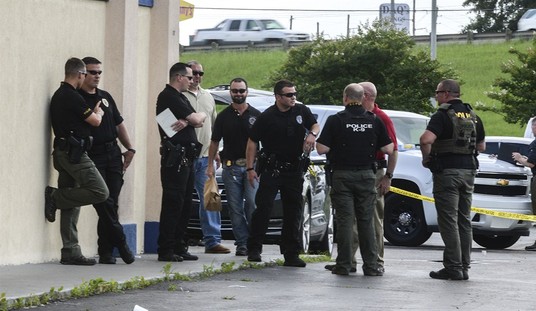Is it really possible to draw valuable lessons from this tragic-comedy of a government shutdown?
Insofar that Americans are paying attention, yes. But if all you do is pay attention to the posturing, the political theater, chances are you learn nothing.
President Obama has done a beautiful job of framing the shut down in ways that the American people can’t fail to understand; you need government more than you think and all these bad things that happen would be even worse if those crazy Republicans were put in charge.
On the other hand, lacking unity of purpose, the Republicans have been unable to generate much of a narrative except to accuse Obama of playing politics with the shutdown.
Both sides are guilty of overreach. Obama on shutting down venues unnecessarily and Republicans on trying to defund Obamacare. But despite the effort to carefully choreograph this kabuki dance for maximum PR effect, it’s the American people who have surprised both sides.
Vets marching en masse to the memorials to physically tear down the artificial — and cynical — attempt by the president to generate outrage against Republicans. And, as AP reports, here and there around the country, private citizens and organizations are taking responsibility for their own communities and donating time and money to help those in need:
For 16-year-old Alishe’ah Sockwell, federal money makes a big difference.
It helps put a roof over her head. It allows her mother, Nia, to undergo job training. And it pays for childcare for Sockwell’s young daughter so that Sockwell can go to high school every day in Little Rock, Arkansas.
But with some federal funds out of reach because of the shutdown, Sockwell may have to stay home from school in order to watch her daughter. If the shutdown drags on much longer, her housing could be in jeopardy, too.
So, to fill in the gaps, the nonprofit organization that provides Sockwell and other homeless people in Little Rock with childcare, shelter and other assistance, has asked community members to chip in.
Donations trickled in for that organization, called Our House, and something similar is happening around the U.S.
Across the country, donors big and small are opening their wallets to help keep afloat programs that protect people in need as the government shutdown persists. A pair of Texas philanthropists pledged up to $10 million to help Head Start pre-kindergarten programs for poor children hurt by the shutdown. A university in New Hampshire decided to offer scholarships to active-duty military personnel whose tuition assistance has been switched off by the shutdown.
And in Arkansas, people have been donating to Our House.
But those donations aren’t enough to cover the federal funding tied up by the shutdown that began Oct. 1.
No, that’s true. But this was a spontaneous response to a crisis. Imagine if communities organized themselves to deal with their neighbor’s problems year round? Of course, such voluntary community assistance wouldn’t cover everyone in need. But think of the benefits of shrinking the anti-poverty bureaucracy to a more manageable size.
And that brings us to another surprise that has emerged from the shutdown crisis. People are looking around and seeing that the sky isn’t falling, the earth isn’t being swallowed up by a gigantic sink hole, and the sun still rises every morning in the east even though the government is partially shut down.
With landmarks closed, paychecks delayed and workers furloughed, Americans are drawing dueling lessons from the rippling effects of the partial shutdown: The disruptions show that the feds are way too involved in people’s lives or that the government does a lot of vital things that people take for granted.
There’s a messaging war underway to see which viewpoint will prevail. But any shift in public opinion also may well hinge on how much, or how little, people are personally affected as the shutdown drags on.
“It definitely has brought to life what’s going on,” says Pamela Jones, a lawyer from Richmond, Calif., who’s noticing the shutdown’s effects all around her, in closed national parks, disrupted weddings, shuttered restaurants and “life moments and events destroyed.”
Jones, 54, a Democrat and fiscal conservative, finds herself torn in the too-much, too-little debate over the federal government, and says the shutdown at least is giving “more information to the common man, so to speak.”
Jim Chenye, a former marketing manager in Birmingham, Ala., sees no argument for the importance of government in the shutdown’s rippling effects.
“I’m never an advocate of a larger federal government,” says Chenye, 64, a Republican. The shutdown and debt ceiling debate show the government’s broken, Chenye says, but he figures the annoyances of the moment will be long forgotten before people vote in the 2016 elections.
As with the sequester, the administration oversold the idea of catastrophe if a shut down occurred. But people adapt or make do with what they have. We’ve always done that. It’s just that in the last few decades, we’ve forgotten how to. Self-reliance is an American birthright, something in which individuals used to take an enormous pride.
It’s not that we don’t “need” government. I would have hated it if we had to rely on state militias to take down the Taliban in Afghanistan in 2001. And a social safety net for those in genuine need is a necessity to keep people from dying in the streets of starvation or exposure. There are hundreds of other things that a 21st century urban industrialized society asks of government — things that only the federal government can do. The questions being debated are how much government do we need and, just as importantly, how much can we afford?
If we ever get serious about this debate and deal with those questions, conservatism will once again become ascendant.










Join the conversation as a VIP Member